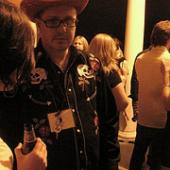On dialogue
Editorial

I would be curious to go back to the 1940s and read the rejected submissions by fledgling playwrights from the era. I am curious about dialogue. Perhaps wrongly, I imagine the rejected plays to either exhibit a failed version of the wit of Wilde or Coward or the stylized working-man oration of Odets. Done badly, neither would be much fun to read (unless they failed spectacularly), but I find myself curious because I read the rejected scripts of our era, and the dialogue in it seems to be trying to sound like nobody at all.
There aren’t many genres of theater where dialogue is unimportant, and many in which it is paramount, with theater functioning as the staging of language. And yet I find myself reading script after script in which the dialogue doesn’t do much of anything besides carry a spear. Every spoken line is written in a strangely character-less style, with everybody expressing themselves precisely the same way. And it’s not merely that every character in a play talks like every other character in that play. Every character in every play sometimes seems to speak like every character in every other play. There are exceptions, of course, but they’re rare, even in plays that actually get produced.
I don’t know what we’d call this approach to dialogue. North American Neutral? Exposition Standard? But I can identify its features, or lack thereof. It shows no regional variation. It shows no variation based on the education level of the character, or their cultural group, or their class, or professional experience. Its primary feature is that people say precisely what they mean, without ever being circumspect or masking any subtext. And it relies on precisely two tricks: When people get emotional, the dialogue gets choppy, and when they are not being emotional, the dialogue tends to use a lot of sarcasm. And this is a very familiar approach to dialogue: If there is more emotion, it’s the language of the television drama, and if there’s more sarcasm, it’s the language of the television sitcom. I believe that contemporary playwrights still read plays by other playwrights. I also believe that many of them demonstrate that television writing is their primary influence -- not just in dialogue, but in things like transitions and even plotting, which I may detail in a later article.
The uses of dialogue
For now, let’s stick with dialogue. I suspect many playwrights use dialogue for one function -- to tell the audience what they need to know. And that is a function of dialogue, yes, but a rather limited one. I’d like to offer some suggestions for expanding the role of dialogue. Firstly, in general, character shows itself through action, not dialogue. It is very possible to claim you are one thing but through your actions show yourself to be something else. When we rely on dialogue to communicate only the facts of a story to our audience, we take away the possibility of deception, and self-deception. We end up with a theater in which every single character is a reliable narrator of their own experience, and the truth is that this is just not a very interesting approach to theater. Liars are interesting characters. So are characters who deny certain truths to themselves. Almost the entirety of 20th century theater relies on lies, secrets, and untold or unacknowledged truths. Our stage dialogue should never be more truthful than the character that expresses it, except for those moments in which a liar accidentally tells the truth, or is forced to, which generally falls at the climax of a play. And don’t limit this to just one big lie. People tell little lies all the time, for convenience, or out of habit, or out of a lack of knowing the truth. People hint at things rather than say them outright. In the real world, when people fight, they’re often fighting about something unacknowledged. Whatever they think they’re fighting about, it’s something like a shadow puppet show, masking the real complaints. Because the truth is that people are extraordinarily bad at knowing why they’re angry, and they’re even worse at excavating the truth, which can be painful or embarrassing. Why should our stage characters be less circumspect? Why should their hidden truths be less painful or embarrassing?What dialogue reveals about character
Beyond the question of what is being expressed, there is also how it is expressed. As I mentioned above, dialogue tells us all sorts of things beyond the facts of a play. Here’s a brief list of some of what is expressed by dialogue:- Regional origins: Somebody from New Orleans is going to express thing differently that somebody from Los Angeles. A neutral ground in the street to one is a median to another. A banquette is a sidewalk. A parish is a county.
- Ethnic, religious, and cultural origins: Somebody who was raised Jewish is more likely to make use of occasional Yiddishisms than somebody who wasn’t. A Mexican-American is more likely to make use of Spanish. Somebody raised within an Evangelical household will have access to certain Biblical idioms that somebody raised atheist probably won’t.
- Class and work experience: Theater people are more likely that anybody else to reflexively say “break a leg” rather than “good luck.” A sous chef is likely to use certain words related to work that a college professor isn’t, and vice versa. Many professions have their own language, and it is useful to know the jargon, the shorthand, and the technical language of your character’s job.
- Educational experience: I would discourage the idea that characters with more education use language better than than characters without, but they typically use language differently. We develop our linguistic sophistication in the environment that produces it, and so while a jailhouse lawyer and somebody who has studied contract law might be equally verbose, they’re probably going to express themselves differently.




